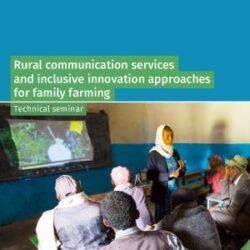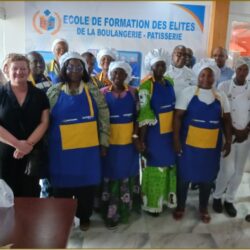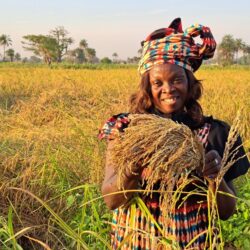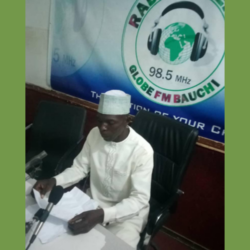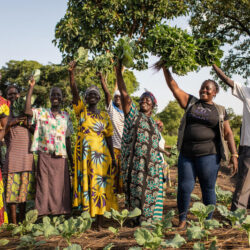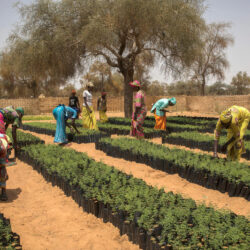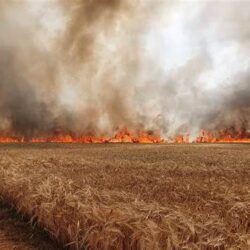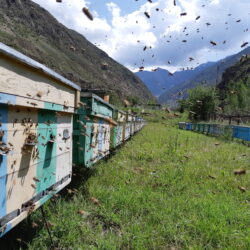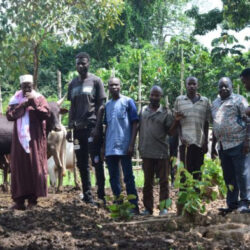Categories
Archives
Rural communication services and inclusive innovation approaches for family farming
The United Nations Decade of Family Farming (UNDFF) recognizes communication as a crucial driver in transforming agrifood systems, empowering family farmers through inclusive Rural Communication Services (RCS). Over the past five years, FAO-supported regional initiatives – ComDev Asia, YenKasa Africa, and Onda Rural – have worked to mainstream RCS into family farming policies, fostering participatory knowledge sharing and innovation. This report presents key insights from the 2024 technical seminar held
PROPAC: Study Tour to Senegal for the Promotion of Bread‑making with Local Flours
From 27 January to 1 February 2025, the Regional Platform of Farmers’ Organisations of Central Africa (PROPAC) took part in a study tour in Senegal. Organized by ASPRODEB, the visit brought together leaders of farmers’ organisations, processors, and bakers to explore Senegal’s successful experiences in incorporating local cereal and tuber flours into bread and pastry production. A Project under the FO4FS Initiative PROPAC is a beneficiary of the FO4FS (Farmers’
Rural women ring in change in West Africa
Across West Africa, rural women are showing that small-scale agriculture isn’t just the foundation of sustainable global food systems – it’s an avenue for economic, social and political empowerment. Meet three women who are leading their communities towards a more prosperous and equal future. Breaking ground When Anta was growing up, it was customary for young women to leave their homes in Ngoudiane to find domestic work in Dakar, the Senegalese capital. Anta
Radio for impact: Hervice Kouassi champions youth and community issues in Côte d’Ivoire
Hervice Kouassi’s journey into broadcasting began not in a studio, but at the heart of his rural village in Côte d’Ivoire. Growing up in a family of farmers, Mr. Kouassi was drawn to radio, which was the primary source of information and entertainment for his community. His passion for this medium took root early, shaping the course of his career. After completing his Baccalaureate, Mr. Kouassi’s parents initially urged him
Broadcasting for change: How Salisu Hamza empowers farmers in Nigeria
Salisu Hamza is a radio broadcaster with over a decade of experience at Globe FM, part of the Federal Radio Corporation of Nigeria, located in Bauchi State. Driven by a deep passion for radio, Mr. Hamza has built a successful career, dedicated to educating and empowering rural communities and small-scale farmers. His broadcasts have made a meaningful impact, providing vital information on agriculture and livestock management. For the past ten
Global Call for Stories: Family farmers at the heart of climate-resilient and sustainable agrifood systems
Sharing and learning from the experiences of individuals and organizations driving positive change is critical to advancing the agricultural sector towards greater sustainability. All over the world, there are thousands of stories of distinctive work carried out anonymously by family farmers, including women and youth, on successful transitions to more inclusive, sustainable and fair food systems. Those stories are based on co-creation and sharing of traditional knowledge and innovations that
Radio Programme: Reforestation and Forest Restoration in Madagascar’s Diana Region
In Madagascar’s Diana Region, the OPFA Union Matanjaka is spearheading a vital reforestation programme aimed at restoring forest landscapes and strengthening local livelihoods. Produced by the Réseau SOA and OPFA Union Matanjaka, and broadcast in Malagasy across four key radio stations—Radio Varatraza, Radio Anivorano, Radio RLA Ambilobe, and Radio MAZAVA Ambanja—this radio feature is part of the YenKasa Africa Radio Initiative. It highlights how rural communities are regenerating the environment
Radio Programme: Wildfire Management for Sustainable Agricultural Production in Ghana
Every dry season, fires sweep across Ghana’s savannah landscapes—scorching farmlands, destroying forests, and threatening food security. But what if the very communities affected by wildfires hold the key to stopping them? In this powerful radio feature, which is part of the YenKasa Africa Radio Initiative, Radio Savannah, broadcasting in Gurune, shines a spotlight on wildfire management as a vital path to sustainable agriculture. Through voices from the ground—farmers, women entrepreneurs,
New digital technologies boost beekeeping for smallholder farmers and family beekeepers
Beekeeping, or apiculture, is not just a hobby or a side job – it is a vital agricultural activity and essential for food security and biodiversity. Beekeepers, often smallholder or family farmers, play a crucial role in sustaining ecosystems through pollination and ensuring the health of countless crops. The publication Digital Technologies and Solutions for Beekeeping explores how innovative technologies are helping support this vital practice, boosting productivity and complementing
Local Support Frameworks: Pillars of Economic Development for Farmers’ Organizations in Central Africa
For over a decade, National Farmers’ Organizations (NFOs) in Central Africa have benefited from structured support aimed at enhancing their economic viability and integration into agricultural value chains. Within this dynamic, Local Support Frameworks (LSFs) play a crucial role by providing strategic and technical assistance to NFOs affiliated with PROPAC, particularly within the framework of the FO4ACP (Farmers’ Organizations for Africa, Caribbean, and Pacific) program. From PAOPA to FO4ACP: The

